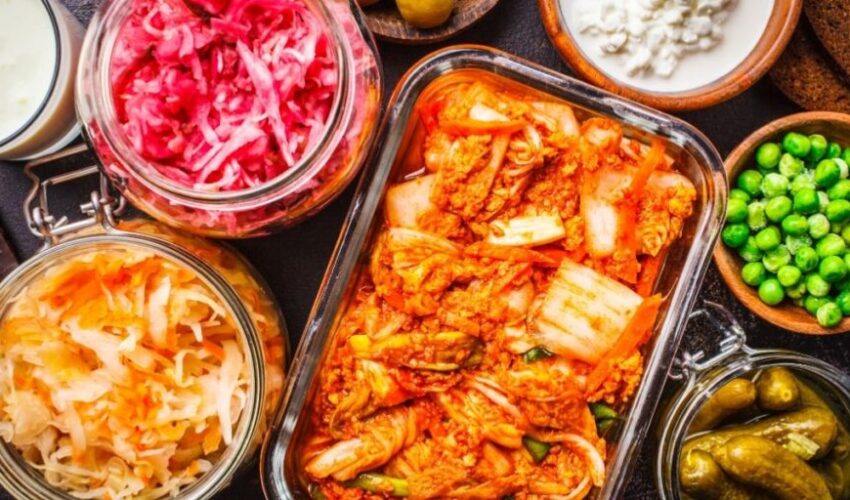10 Dairy-Free Probiotic Foods You Should Be Eating Everyday

Published Sept 23, 2020
Let’s face it; going through life with lactose intolerance can be challenging. You can’t enjoy the same wide variety of food that other people can without bloating or excessive gas. And when you shop for food, you have to be extremely cautious of specific ingredients, ensuring everything is “dairy-free.”
Gastrointestinal health is becoming more and more prominent in the health landscape today. In the past two decades, many studies have shown our gut health to be quite impactful to our immune system, mental health, autoimmune diseases, and even cancer. Plenty of factors contribute to our gut health, one of which being our gut microbiome.
The gut microbiome is the genetic material of all the microorganisms found in our gastrointestinal tract. These microorganisms include bacteria, fungi, viruses, protozoa, and fungi. While we generally associate those terms as being harmful, some of them can be very beneficial.
Probiotics are the good bacteria that mostly reside in our guts, providing plenty of benefits. They fight off serious diseases, such as:
- Irritable Bowel Syndrome (IBS)
- Inflammatory Bowel Disease (IBD)
- Antibiotic-associated Diarrhea
We can populate our gut microbiome with probiotics in two ways: food and supplements. However, if you had to choose between those two, food will always be the better option. It’s simply better to receive your nutrients through food than through pills and powders. But for us lactose intolerant people, our choices can be limited. While we try to consume food that will improve our gut health, we also want to select those that won’t turn us into uncontrollable gas monsters.
But don’t you worry; I’ve got you covered. I’ve compiled a list of some of the most probiotic-rich dairy-free food. So, let’s get right to it.
Sauerkraut
Sauerkraut is an extremely popular dairy-free side dish you’d often see with all sorts of sausages. You can also find it in many delicatessens (delis) as a topping on your favorite sandwiches, including the Reuben. But did you know, this fermented cabbage dish can be extremely beneficial to your digestive health? Aside from being rich in probiotics, sauerkraut is packed in fiber, vitamins, and minerals. So, the next time you enjoy a delicious bratwurst, be sure to ask for an extra helping of sauerkraut.

Kimchi
With sauerkraut being the popular choice in Germany and the west, a different dish dominates the east. Meet kimchi, the spicy Korean counterpart of sauerkraut. Kimchi is yet another dairy-free fermented cabbage dish, usually mixed with garlic, radish, onions, carrots, and various chili peppers. The fermentation process with kimchi creates an ideal environment for probiotics to thrive and multiply. It is loaded with essential nutrients like vitamin K, riboflavin, and vitamin B6.
Tempeh
With origins from Indonesia, Tempeh is a traditional fermented soy product. As you might have already noticed, fermentation is a common denominator when it comes to probiotics. But back to the topic, tempeh is incredibly popular among vegetarians as a meat substitute since it is packed with proteins. In Java, Tempeh is actually a staple source of protein there. Along with its massive protein content, tempeh contains a lot of riboflavin, vitamin B6, and niacin.
Miso
If you’ve been to Japan or have Japanese friends, you’re probably quite familiar with miso. Miso is another fermented soy product, but it’s quite different from tempeh. It’s not quite a dish you eat on its own. Miso is a thick paste used for sauces and soups, enhancing the flavor of various dishes. Like most soy products, it is packed with protein, vitamins, and minerals. But you should also be careful when cooking with miso, as its sodium content can be high.
Kombucha
In recent years, kombucha has gone from an obscure hipster craft drink to a widespread “health drink.” And that isn’t for nothing. Kombucha is a dairy-free fermented sweet tea, which resembles the flavor profiles of a dessert-like apple cider vinegar. It’s also akin to soda with how fizzy it is. Like many other teas, it doesn’t have many nutrients, aside from its probiotic content.
Natto
For those who have never heard of natto, you’re in for quite a shock. Natto is a fermented soy dish, recognizable through its sticky, stringy, and slimy appearance. Its smell also comes off as quite pungent and sour. Natto is what most people call an acquired taste, but it is absolutely packed with nutrients, rich in fiber, vitamins K and B-complexes.
Green Olives
Treat yourself to a martini, but make sure you go ham with the olives. Olives are super rich in vitamin E and powerful antioxidants. These make them quite beneficial in maintaining good heart health. Since olives are very bitter when fresh, they’re usually fermented to remove the bitterness. The result is food that is high in probiotics, fiber and is extremely enjoyable.
Apple Cider Vinegar
Walking down the refrigerated items aisle in a supermarket, you might come across some apple cider vinegar drinks. This begs the question, “who, in their right minds, would drink vinegar?”
Well, apple cider vinegar is a little different. Mixed with other ingredients for flavoring, it can make for quite a pleasant drink. While it is rich in probiotics, research suggests that apple cider vinegar may also aid in weight loss.
Water kefir
Water kefir is the dairy-free alternative to kefir, which is essentially a fermented milk drink. Like with kombucha, it requires a starter culture of bacteria and yeast called water kefir grains. This starter culture helps ferment practically any liquid to form a mild-flavored and healthy drink.
Pickled vegetables
The last dairy-free food on this list is pickled vegetables. Pickled vegetables usually result from leaving vegetables in a brain, which is water mixed with salt. These vegetables then become quite a tasty and probiotic-rich snack or side dish. Some popular pickled vegetables include:
- bell pepper
- radish
- cucumber
- carrots
- beans
- beets
- onions
- tomatoes
You should be careful about consuming too many pickled vegetables, as they’re shown to have high sodium content. This could lead to high blood pressure and greater water retention.
(Related: Looking to Detoxify? Here’s Why You Should Include Probiotics In Your Regimen)
Benefit From The Latest Advancements In Probiotic Science With Bionaze
Bionaze is a proprietary blend of probiotics proven to promote ear, nose, and throat health, improve digestion, and support your immune system. The active ingredients BLIS K12, and BL-04 are considered among the best probiotics according to science.
Get 25% Off Your First Order when you use BIO25 at checkout!

This Content Has Been Reviewed For Factual Accuracy
This content has undergone thorough fact-checking by our team of internal experts. Learn more about the meticulous editorial standard for our website here.
ADVERTISEMENT

About The Author
Judy Ponio is a professional writer based in the Philippines. Her commitment to communicating factual content in when writing is unmatched. She works hard to cross check reputable sources to ensure her work uses accurate facts.




